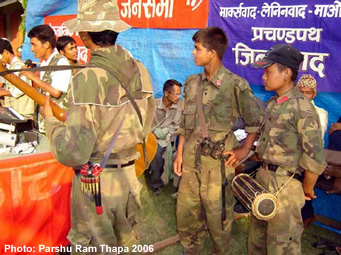|
Facts
on the Conflict: Peace Process
|
|
Security
still a challenge despite peace deal - leaders
|
 |
Kathmandu,
9 Nov 2006 (IRIN)
With
extortion, threats and intimidation still common in many parts of rural
Nepal, security will remain a serious challenge for many months to come
despite Wednesday's landmark peace deal, political leaders said on Thursday.
"The
Maoists have to create an environment free of fear for the people," said
Prime Minister Girija Prasad Koirala, who is also the chairman of Nepali
Congress (NC), the country's largest party. He added that a secure environment
is needed to make the elections for the constituent assembly, scheduled
for June 2007, successful.
 |
| <
Maoist event in Udayapur
In
Wednesday's peace agreement, Maoist rebels signed a comprehensive deal
with the interim government of seven national parties to end the decade-long
armed conflict, which has killed over 14,000 Nepalese.
For
their part, Maoist leaders said that the situation regarding civilians
caught up in the conflict would improve now that a peace deal had been
signed. "We will become part of the government
and no violence will be tolerated by our party," Maoist leader Prachanda
said. |
|
For
their part, Maoist leaders said that the situation regarding civilians
caught up in the conflict would improve now that a peace deal had been
signed. "We will become part of the government and no violence will be
tolerated by our party," Maoist leader Prachanda said.
But
interim government members have yet to be convinced. "Even now, civilians
live in total fear of the Maoists and it is time that they proved themselves
as a political party," said Pasupati Rana, chairman of the Rastriya Prajatantra
Party (RPP), one of the country's leading parties.
 |
| <
Maoist poster
The
Maoists, who had been waging an armed rebellion since 1996 against the
Nepalese state, agreed to a mutual ceasefire with the government following
the end of the absolute rule of the Nepalese monarch, King Gyanendra, in
April after a mass uprising against him.
For
the last 10 years, civilians have been subject to extra-judicial killings,
forced disappearances, torture and widespread internal displacement at
the hands of both the Maoists and government forces, according to Insec,
a prominent Nepalese human rights organisation.
The
rebel leader added that his movement had agreed to the contentious issue
of management of their arms and ammunition and that this was a clear move
to build bridges with civilians who may have suffered during the civil
war. |
|
The
Maoists had been waging an armed rebellion against the Nepalese state since
1996, despite two rounds of peace talks in 2001 and 2003 designed to end
the conflict.
Credit
IRIN 2006
Copyright
© UN Office for the Coordination of Humanitarian Affairs 2006
[
This report does not necessarily reflect the views of the United Nations]
Integrated
Regional Information Networks (IRIN), part of the UN Office for the Coordination
of Humanitarian Affairs (OCHA).
|





